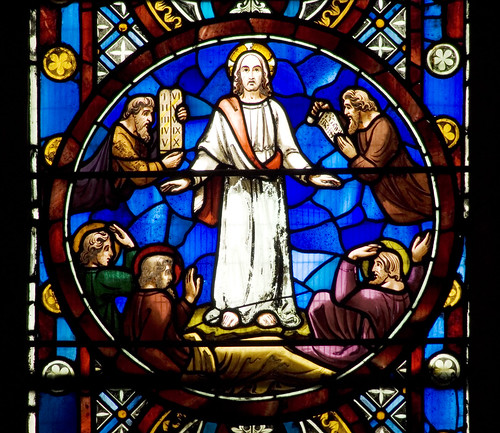 We are into the 2nd Week of Lent and the Gospel comes up with the Transfiguration. The 1st Reading speaks of the covenant God made with Abram and the 2nd Reading urges the Christians to remain faithful to Christ. What connexion can we make between the Transfiguration, covenant and fidelity?
We are into the 2nd Week of Lent and the Gospel comes up with the Transfiguration. The 1st Reading speaks of the covenant God made with Abram and the 2nd Reading urges the Christians to remain faithful to Christ. What connexion can we make between the Transfiguration, covenant and fidelity?First, let us take a look at the Transfiguration. What is it about? It is a foretaste of a future to come. In the first place, the radiance of Christ’s face shows us who He really is. We get this confirmation at the end when the voice broke through the cloud to announce: This is my Son, the Chosen One. Listen to Him”. The radiance on Christ’s face is a reminder that the kingdom that He has come to establish is not of this world. The 3 apostles got a foretaste of the life that awaits them and us.
But, a foretaste is just that. No matter how blessed the moment, it is not meant to last. This is what Peter may have missed because he asked if he could build 3 tents for the 3 personages of Jesus, Moses and Elijah. In the pilgrimage of life, a foretaste is also preparation. Perhaps the best way to describe the Transfiguration experience of Peter, James and John is to take a look at the “lay-bys” of the highways. They are never meant to be destinations. No matter how wonderful they may be constructed—grand motels, food courts, picnic parks—the fact remains that they are just stops, watering holes in the on-going journey.
So, the Transfiguration may be the most wonderful experience but it is not meant to be a permanent one. Just like nobody would ever mistake a lay-by or a pit-stop of the F1 to be the final destination. In this sense, we can now understand how the covenant of the 1st Reading comes into play. God makes a covenant with a people on the pilgrimage of life giving them the assurance that He will never be far from them. And He is not.
We begin to appreciate God’s nearness when we examine the details that make up this covenant between Abram and God. In the ancient rite of making a covenant, the ratification of the covenant between the contracting parties requires that an animal or animals be cut in halves and the contracting parties are to walk between the divided parts. When they do so, they invoke the fate of the animals on themselves should they fail to observe the terms of the covenant. In this covenant between God and Abram, we actually do not have two contracting parties. Instead, we have only one. It is God Himself who makes this covenant with Abram as symbolised by the smoking furnace and a firebrand passing between the slaughtered halves. The birds of prey symbolised Israel’s enemies. In the encounter of Abram, we meet a God who is more than faithful as you will discover soon.
This faithfulness of God brings us immediately to what we are doing at Lent. It is an invitation to fidelity on our part. The 2nd Reading gives us the clue as to how we can be faithful. It speaks of “food” and here we enter into familiar territory. Many of us instinctively know that our relationship with this world is temporary. We may acknowledge this temporality or choose to ignore it. But, when we do penance, we tacitly acknowledge the temporal nature of our relationship with the world.
Lent reminds us of this for at its outset, many would have decided to make sacrifices with regard to alcohol, chocolate or tobacco—to refrain from the fleeting joys of these pleasure-inducing substances. St Paul reminds us that when we make earthly satisfaction the aim of this life, then we have made what is impermanent our god.
As such, the Transfiguration, this little foretaste for us, is both a temptation as well as an encouragement. Temptation, because we might mistake it for the real thing—just like sometimes we mistake food to be. This temptation is reflected in the larger life. We often make plans for this life without thinking of which life as being more important. If you like, our plans are often short-sighted because our vision does not pierce beyond the horizon of temporal life.
Therefore, the Transfiguration must be better thought of as encouragement as we hear St Paul exhorting the Philippians to think beyond and to remain faithful; an encouragement to look beyond the tip of Tabor to the crown of Calvary. Both what we have been given and what we choose to deny ourselves of are directed to the summit of Calvary and importantly beyond. At Tabor, the Apostles were prepared not just for the passion and death of Christ, but also His resurrection. The exhortation of St Paul is couched in the language of a God who is faithful. Yes, we will fail and fall surely we will but take heart because throughout the whole history of human failure since the time of Abram, God Himself could have abandoned us but He did not. In fact, He will seal that covenant with Abraham with no less than the Blood of Christ His Son. The liturgy of the Eucharist, which is the covenant made real for us, is so real that the 2nd Reading speaks of it in a language which we resonate with, whereby the wretched bodies of those who eat of the Body and drink of the Blood of Christ will be transfigured into copies of His glorious Body.
So, we are still at the beginning of Lent and experience will bear us out, that during Lent, temptation will be even more acute. We would be tested even more. Why should it not be when our Lord Himself was tested for forty days? So, take heart. If Satan is near, God is nearer. Let us not take our eyes from the goal, which is to be transfigured into copies of His glorious Body.

